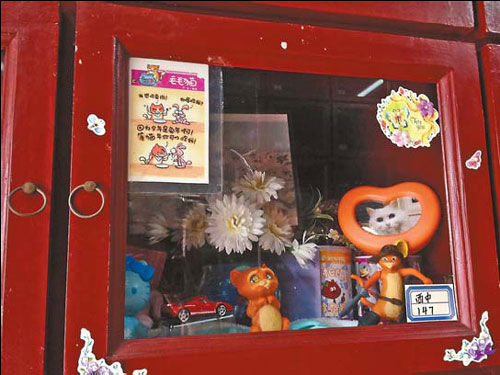Heavenly pets
Updated: 2012-09-13 09:37
By Wang Kaihao, Xu Lin (China Daily)
|
|||||||||||
 |
|
At the center's columbarium, cabinets are rented to pet owners. |
Liao estimates more than 400 cats and dogs die every day in the capital, but the center only receives about 30 animals every month.
Related: Furry, four-legged pals, this way please
He says it's important to raise public awareness of dealing with dead animals properly because they produce disease-causing bacteria and there are many zoonotic diseases.
He says some pet owners pay hospitals a small fee to burn their dead pet together with trash in garbage incinerators. Pets with infectious diseases must be cremated and not buried. Their belongings, such as feeding bowls, must also be burnt and the home must be carefully disinfected.
He says under normal circumstances, it is safer if the animals are buried more than 1.5 meters deep, and the earth must be layered with three coats of disinfectant.
Qin Xiaona, head of Capital Animal Welfare Association, is a solid supporter of deep burial.
"We can't change the current situation where cremation is the most common way of dealing with corpses in China," she explains. "But for animals, we should apply deep burial because it saves energy and harmonizes with the environment and the cycle of life."
She says there are some forests in the southern and western outskirts of Beijing that are ideal for burials.
"The process shouldn't be complicated. A tombstone is not necessary and it is good for animals to peacefully return to nature."
But, the idea does not suit everyone.
Qiu Hong, a former car dealer, from Qingdao, Shandong province, opened Heaven Pets Service, the province's first pet crematory in August.
"Nearly everyone around me buries their pets under the ground," says Qiu, who has been aspiring to set up a pet crematory since her 17-year-old cat died in 2010. "But, our ground is rock-based. I can't dig more than 30 cm deep."
Qiu also makes an effort to give pets graceful farewells. The company offers delicately designed coffins and holds funerals for animals in a mourning hall decorated with flowers. The ashes can only be kept in the institutions for three years at most.
"Ultimately, we expect owners to spread the ashes in the ocean," she says.
"It is unnecessary to reserve land as pets' burial grounds. Our emotions and memories are more important. We respect our animal friends, but we should also respect nature."
According to Liao, there is market potential but currently, there is no proper system. He hopes the government will regulate the market and register more pet crematories.
Shanghai launched a rule in May 2011, requiring pet owners to send all animal remains to professional institutions, rather than handling deceased pets themselves. But most Chinese cities, including Beijing, do not have official guidelines on how to deal with the matter.
"There are no laws in China about pet cremation and the funeral industry. The situation is different in Western countries such as France and Germany, where there are mature laws," Liao adds.
Contact the writer at wangkaihao@chinadaily.com.cn and xulin@chinadaily.com.cn.
Related Stories
Furry, four-legged pals, this way please 2012-08-16 09:23
Who let the dogs out? 2012-08-16 09:19
George Clooney treats dog to spa day 2012-06-28 08:57
Huge choice for pet owners to pick from 2011-09-10 15:41
Pet trade's four Ps: prim, proper, profitable pampering 2011-09-10 15:41
Today's Top News
Rescuers race against time for quake victims
Telecom workers restore links
Coal mine blast kills 18 in Jilin
Intl scholarship puts China on the map
More bird flu patients discharged
Gold loses sheen, but still a safe bet
US 'turns blind eye to human rights'
Telecom workers restore links
Hot Topics
Lunar probe , China growth forecasts, Emission rules get tougher, China seen through 'colored lens', International board,
Editor's Picks

|

|

|

|

|

|





